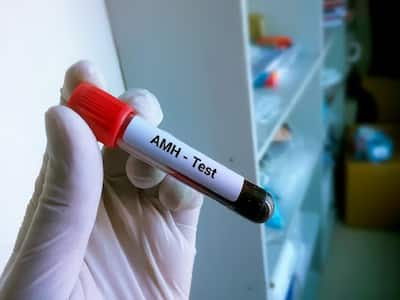
AMH testing has emerged as a pivotal tool to evaluate a woman’s ovarian reserve and fertility potential.
If you’re struggling to conceive and want to know your chances of getting pregnant, you may be recommended to undergo Anti-Mullerian Hormone test or AMH test. It is a simple blood test used to evaluate a woman’s egg reserve and diagnose problems such as PCOD, early menopause, or low ovarian reserve. Dr. Archana Dhawan Bajaj, Gynecologist, Obstetrician and IVF Expert, Nurture IVF Clinic, New Delhi, explains the crucial role of Anti-Mullerian Hormone testing in female fertility treatment.
The association between AMH levels and female fertility
Anti-Mullerian Hormone (AMH), a hormone synthesized by cells within the ovarian follicles of females, holds significance in assessing reproductive health. These ovarian follicles, small fluid-filled sacs nurturing developing eggs within the ovaries, contribute to AMH production. The presence of AMH in the bloodstream becomes a pivotal gauge for a woman’s ovarian reserve, signifying the quantity and quality of eggs remaining in her ovaries. As a linchpin in reproductive medicine, AMH testing has emerged as a pivotal tool to evaluate this critical facet of female reproductive health.
AMH’s role in female physiology orbits around its correlation with the growth and maturation of ovarian follicles. During egg development within these follicles, AMH secretion occurs. Blood levels of this hormone serve as a barometer for both the number of ovarian follicles and the eggs residing therein. Through AMH testing, comprehension of a woman’s ovarian reserve becomes feasible, holding ramifications for reproductive well-being.
Purpose of AMH testing
Fertility Evaluation: Foremost, AMH testing aids in gauging female fertility. Diminished AMH levels could imply a reduced ovarian reserve, potentially impacting natural conception abilities. This holds particular pertinence for women aiming to conceive or contemplate pregnancy in the immediate future. For those desiring insight into future fertility prospects, AMH testing can provide information for informed decision-making.
Tailored Treatment Approaches: In the landscape of fertility treatments, like in vitro fertilization (IVF), AMH testing becomes pivotal in tailoring treatment strategies. Divergent responses to medications and stimulation protocols can be anticipated based on varying AMH levels. Attaining a grasp of a woman’s ovarian reserve via AMH values empowers fertility specialists to adapt treatment plans for optimal success rates.
Insights into Age-related Factors: As age inversely impacts fertility due to dwindling egg quantity and quality, AMH levels offer nuanced insight into how ovarian reserves correspond with age. Some women might exhibit elevated AMH levels for their age, indicating robust ovarian reserves, while others might present lower levels of signalling decline. This information holds special value for women contemplating delayed pregnancy, granting a clearer fertility timeline.
READ RELATED: The 10 Healthiest Sources of Protein You Can Eat
Reproductive Health Monitoring: AMH testing remains invaluable for tracking ovarian reserve fluctuations over time. Regular assessments of AMH levels aid women in comprehending the evolution of their fertility and the need to contemplate alternative family planning avenues. This becomes particularly relevant for women potentially susceptible to premature ovarian insufficiency or those contending with medical conditions impacting fertility.
Take away
Despite AMH testing’s informative prowess, it’s paramount to acknowledge that fertility is an intricate interplay of diverse elements, encompassing egg quality, hormonal equilibrium, and overall well-being. AMH levels furnish only a fraction of the puzzle and should be contextualized within the ambit of additional diagnostic tools and medical evaluations.
The necessity of AMH testing for an individual woman hinges upon her distinct circumstances, objectives, and medical history. Consultation with healthcare practitioners, especially reproductive endocrinologists or fertility specialists, remains pivotal in informed decision-making. These professionals navigate women through the process, elucidating AMH testing’s advantages and limitations within the broader spectrum of reproductive health. Ultimately, AMH testing can provide invaluable insights into ovarian reserves, guiding fertility planning, treatment determinations, and holistic reproductive welfare.
Total Wellness is now just a click away.
Follow us on
Don’t Miss Out on the Latest Updates.
Subscribe to Our Newsletter Today!
window.addEventListener(‘load’, (event) => {
$(‘#commentbtn’).on(“click”,function(){
(function(d, s, id) { var js, fjs = d.getElementsByTagName(s)[0]; if (d.getElementById(id)) return; js = d.createElement(s); js.id = id; js.src = “//connect.facebook.net/en_US/sdk.js#xfbml=1&version=v2.3”; fjs.parentNode.insertBefore(js, fjs);}(document, ‘script’, ‘facebook-jssdk’));
$(“.cmntbox”).toggle();
});
});







